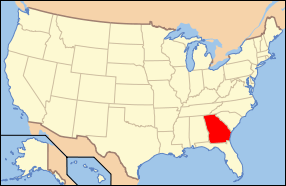LGBT rights in Georgia (U.S. state)
| LGBT rights in Georgia | |
|---|---|
 | |
| Same-sex sexual activity legal? |
Legal since 1998 (Powell v. Georgia) |
| Gender identity/expression | - |
| Discrimination protections | None (see below) |
| Family rights | |
| Recognition of relationships | Same-sex marriage since 2015 (Obergefell v. Hodges) |
Restrictions: | Georgia Constitutional Amendment 1 previously limited marriage to heterosexual couples, placed restrictions on non-marriage types of same-sex unions |
| Adoption | - |
LGBT residents in the U.S. state of Georgia face legal challenges not faced by non-LGBT individuals. Same-sex sexual activity has been legal since 1998, and same-sex marriage has been legal since 2015.
Laws against homosexuality
Homosexual acts are legal in Georgia, previously criminalized until the state's sodomy laws (which applied to both homosexuals and heterosexuals) were struck down in 1998 by Powell v. Georgia (years before the 2003 federal-level strikedown by Lawrence v. Texas).
Recognition of same-sex relationships
Discrimination protection

Georgia law does not protect against employee discrimination based on sexual orientation.[1] The state of Georgia does not protect employees from discrimination based on gender identity. However, Clarke County and the cities of Decatur and Pine Lake protect government employees, and the city of Atlanta protects all employees against discrimination based on gender identity.[2]
Note that statutory law does not provide protections based on gender identity, but on December 6, 2011, in Glenn v. Brumby et al. the Eleventh Circuit Court of Appeals upheld a lower-court ruling that firing someone based on gender-nonconformity violates the Constitution’s prohibition on sex discrimination. The Court of Appeals found the Georgia General Assembly had discriminated against Vandy Beth Glenn, a transgender woman who was fired from her job as legislative editor after telling her supervisor that she planned to transition from male to female. This effectively provides legal protections to transgender and gender non-conforming employees in the states of Alabama, Florida and Georgia.[3]
Hate crimes law
There are currently no hate crime laws based on sexual orientation or gender identity in Georgia.
Gender reassignment
Georgia permits post-operative transgender people to amend their sex on their birth certificates.[4]
Public opinion
A March 2004 Associated Press Exit Poll found that 42% of Georgia voters supported the legal recognition of same-sex couples, with 17% supporting same-sex marriage, 25% supporting civil unions or partnerships but not marriage, and 50% favoring no legal recognition.[5]
A 2012 Public Policy Polling survey found that 27% of Georgia residents thought same-sex marriage should be legal, while 65% thought it should be illegal, while 8% were not sure. A separate question on the same survey found that 57% of Georgia residents supported the legal recognition of same-sex couples, with 24% supporting same-sex marriage, 33% supporting civil unions or partnerships but not marriage, and 40% favoring no legal recognition, with 3% not sure.[6]
An August 2013 Public Policy Polling survey found that 32% of Georgia residents thought same-sex marriage should be legal, while 60% thought it should be illegal, while 9% were not sure. A separate question on the same survey found that 57% of Georgia residents supported the legal recognition of same-sex couples, with 28% supporting same-sex marriage, 29% supporting civil unions or partnerships but not marriage, and 39% favoring no legal recognition, with 3% not unsure.[7]
A September 2013 Atlanta Journal-Constitution survey found that 48% of Georgia residents thought same-sex marriage should be legal, while 43% thought it should be illegal, while 9% were not sure.[8]
See also
References
- ↑ State Bar of Georgia. "What Georgia Employers Need To Know". Georgia Secretary of State. Retrieved January 11, 2011.
- ↑ "Non-Discrimination Laws That Include Gender Identity and Expression". Retrieved January 11, 2011.
- ↑ http://www.lambdalegal.org/in-court/cases/glenn-v-brumby-et-al
- ↑ Human Rights Campaign: Georgia Birth Certificate Law: Gender Identity Issues, accessed July 6, 2011
- ↑ "Georgia: March 2004 – Associated Press Exit Poll – Majority Oppose Any Recognition of Same-Sex Relationships" (PDF). Retrieved 2013-11-02.
- ↑ "GA Republicans split on secession, Deal vulnerable" (PDF). 12/7/2012. Public Policy Polling.
- ↑ "Hillary competitive in Georgia" (PDF). Public Policy Polling.
- ↑ Georgia gets gay marriage when old people die